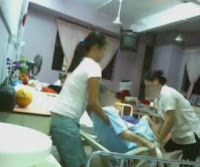 |
| Nightingale Nursing Home Singapore |
These are some measures used by nursing homes here to prevent abuse of patients, several operators told MediaCorp yesterday in the wake of a patient abuse case at Nightingale Nursing Home at Braddell Road.
At seven ECON medicare centres and nursing homes islandwide, staff are taught to handle difficult situations with patients and can seek help from their superiors when needed.
Said a spokesperson from parent company China Healthcare: "We constantly remind staff to be sensitive to our residents' needs and treat them with dignity and respect."
Daily checks are conducted by each centre manager, staff nurses and wards-in-charge and senior management also pay regular visits. Customers may provide feedback via forms provided at the centres, she said.
At Serene and Irene nursing homes, cameras installed last year in all rooms, chiefly to ensure that nursing procedures are carried out properly, serve as "a deterrent" against staff misbehaving and as evidence if patients or a relative allege wrongdoings, said owner Irene Ong.
But some institutions, like The Salvation Army Peacehaven Nursing Home, limit close-circuit television monitoring to common spaces and corridors to give patients privacy. Peacehaven relies on peer monitoring to prevent mistreatment of patients.
Said Peacehaven executive director Low Mui Lang: "Basically, it's ... how you manage and treat your staff. The staff will report to us because if there's mistreatment, and they don't report to us, the whole team will be affected."
Peacehaven has about 160 staff. Each team comprises three to five staff, said Ms Low. The bulk of staff at nursing homes here are from countries such as the Philippines and Myanmar, as many Singaporeans shun the tasks involved, which include lifting, cleaning and bathing patients. Apart from nurses, nursing aides and healthcare attendants are employed at the homes.
Foreign nursing aides either would have nursing certificates or would be practicing nurses in their home countries, while healthcare attendants would either have caregiving experience or possess relevant certificates.
Some nursing homes such as Peacehaven are Institute of Technical Education-certified on-the-job training centres, allowing staff to attend relevant National ITE Certificate programmes.
Others send staff for courses or train them in-house.
In a nursing home context, where tasks such as bathing patients are "quite blue-collar", Ms Ong said she places more value on a potential attendant's temperament than qualifications, which can be taught. Those who are found to have mistreated patients are either reprimanded or dismissed, she added.
Even as they protect the dignity and welfare of patients, nursing homes said it was important to also protect staff from unnecessary abuse by patients and their families.
Peacehaven's Ms Low said such instances are "more frequent than staff abusing residents". The nursing home has put up notices that visitors are not allowed to abuse its staff.
At Serene and Irene nursing homes, while patients sometimes hurl abuse due to dementia, Ms Ong said she takes a firmer stand against those with normal mental faculties who bully staff - she has discharged two to three abusive patients in the past few months.











No comments:
Post a Comment